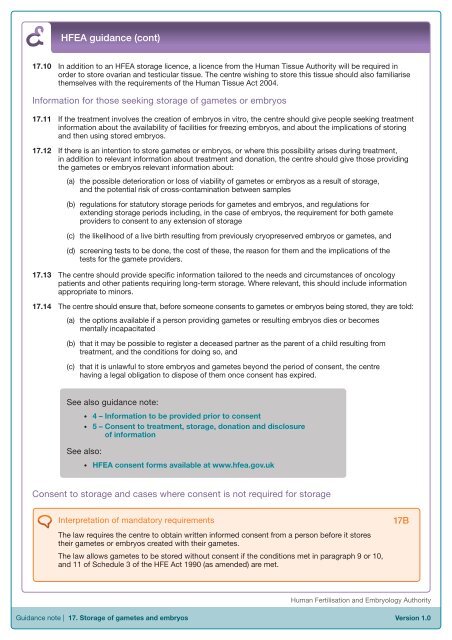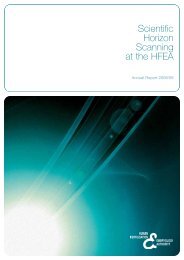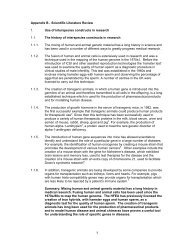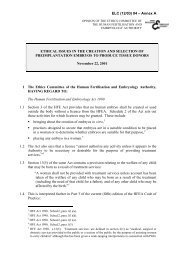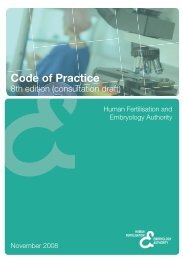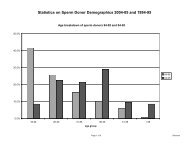Eighth Edition - R.3 - Human Fertilisation & Embryology Authority
Eighth Edition - R.3 - Human Fertilisation & Embryology Authority
Eighth Edition - R.3 - Human Fertilisation & Embryology Authority
Create successful ePaper yourself
Turn your PDF publications into a flip-book with our unique Google optimized e-Paper software.
v<br />
HFEA guidance (cont)<br />
17.10 In addition to an HFEA storage licence, a licence from the <strong>Human</strong> Tissue <strong>Authority</strong> will be required in<br />
order to store ovarian and testicular tissue. The centre wishing to store this tissue should also familiarise<br />
themselves with the requirements of the <strong>Human</strong> Tissue Act 2004.<br />
Information for those seeking storage of gametes or embryos<br />
17.11 If the treatment involves the creation of embryos in vitro, the centre should give people seeking treatment<br />
information about the availability of facilities for freezing embryos, and about the implications of storing<br />
and then using stored embryos.<br />
17.12 If there is an intention to store gametes or embryos, or where this possibility arises during treatment,<br />
in addition to relevant information about treatment and donation, the centre should give those providing<br />
the gametes or embryos relevant information about:<br />
(a) the possible deterioration or loss of viability of gametes or embryos as a result of storage,<br />
and the potential risk of cross-contamination between samples<br />
(b) regulations for statutory storage periods for gametes and embryos, and regulations for<br />
extending storage periods including, in the case of embryos, the requirement for both gamete<br />
providers to consent to any extension of storage<br />
(c)<br />
(d)<br />
the likelihood of a live birth resulting from previously cryopreserved embryos or gametes, and<br />
screening tests to be done, the cost of these, the reason for them and the implications of the<br />
tests for the gamete providers.<br />
17.13 The centre should provide specific information tailored to the needs and circumstances of oncology<br />
patients and other patients requiring long-term storage. Where relevant, this should include information<br />
appropriate to minors.<br />
17.14 The centre should ensure that, before someone consents to gametes or embryos being stored, they are told:<br />
(a) the options available if a person providing gametes or resulting embryos dies or becomes<br />
mentally incapacitated<br />
(b)<br />
(c)<br />
that it may be possible to register a deceased partner as the parent of a child resulting from<br />
treatment, and the conditions for doing so, and<br />
that it is unlawful to store embryos and gametes beyond the period of consent, the centre<br />
having a legal obligation to dispose of them once consent has expired.<br />
See also guidance note:<br />
4 – Information to be provided prior to consent<br />
5 – Consent to treatment, storage, donation and disclosure<br />
of information<br />
See also:<br />
HFEA consent forms available at www.hfea.gov.uk<br />
Consent to storage and cases where consent is not required for storage<br />
Interpretation of mandatory requirements<br />
The law requires the centre to obtain written informed consent from a person before it stores<br />
their gametes or embryos created with their gametes.<br />
The law allows gametes to be stored without consent if the conditions met in paragraph 9 or 10,<br />
and 11 of Schedule 3 of the HFE Act 1990 (as amended) are met.<br />
17B<br />
<strong>Human</strong> <strong>Fertilisation</strong> and <strong>Embryology</strong> <strong>Authority</strong><br />
Guidance note | 17. Storage of gametes and embryos<br />
Version 1.0


